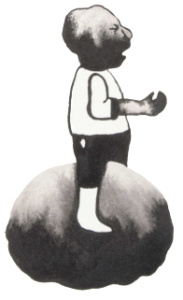Judgment of the European Court of Human Rights of 22 November 2007
In 2000 the Amsterdam Court of Appeal, in the notorious trial against Mink K., ordered the detention of Koen Voskuil, a journalist of the daily newspaper Sp!ts, in order to compel him to reveal the identity of his source which he refused. After his release Voskuil lodged an application against the Netherlands with the European Court of Human Rights (ECHR). The long-anticipated judgment was pronounced on 22 November 2007.
The facts
In March 2000 the Court of Amsterdam had convicted three accused, amongst which the in the Netherlands well known Mink K., of arms trafficking. In the criminal investigation, the Amsterdam police had stated that an arsenal of weapons had been found by chance: the caretaker of a building in Amsterdam had contacted the police when water was leaking from one of the flats in the building, whose occupants were absent. With the aid of two locksmiths, the police had gained entry to the flat and in the subsequent search for the source of the leak, the weapons had been found. The accused lodged an appeal against the judgment of the Court.
On 12 and 13 September 2000 the daily newspaper Sp!ts published two articles, written by journalist Koen Voskuil, in which doubts were expressed about the amount of coincidence allegedly involved in the finding of the weapons. The article of 13 September 2000 quotes an unnamed policeman of the Amsterdam force as commenting in respect of the flooding: “That is what we made out of it. Sometimes you just need a breakthrough in an investigation”.
Subsequently, Voskuil was summoned to appear as a witness for the defence in the appeal proceedings on 22 September 2000. When asked to reveal the identity of his source Voskuil invoked his right of non-disclosure. After having deliberated, the Court of Appeal considered that if the statement made by the police officer to Voskuil was correct, this might affect the conviction of the accused and it also affected the integrity of the police and judicial authorities. Subsequently, the Court ruled that the interests of the accused and of the integrity of the police and the judicial authorities outweighed Voskuil’s interest in not having to disclose the identity of his source. However, Voskuil remained silent, upon which the Court ordered his immediate detention for a maximum of 30 days.
At the next hearing on 9 October 2000, Voskuil once again refused to reveal the identity of his source. Upon this, the Court decided to lift the order for his detention. It considered that for a number of reasons Voskuil’s article was implausible. This being the case, Voskuil’s detention no longer served a purpose. On 30 October the criminal proceedings continued and the Court heard Voskuil, seven other journalists who had published similar articles, two plumbers and a caretaker.
As said, after his release, Voskuil lodged an application against the Netherlands with the European Court of Human Rights.
The Judgement
The Court considers that there is no discussion that there has been an interference with Voskuil’s right under Article 10 of the Convention. The question is whether this interference could be considered “necessary in a democratic society”, as Article 10 of the European Convention on Human Rights prescribes.
Before answering this question the European Court of Human Rights stresses the importance of press freedom: “Since 1985 the Court has frequently made mention of the task of the press as purveyor of information and “public watchdog”. Protection of journalistic sources is one of the basic conditions for press freedom, as is recognised and reflected in various international instruments. Without such protection, sources may be deterred from assisting the press in informing the public on matters of public interest. As a result the vital public-watchdog role of the press may be undermined and the ability of the press to provide accurate and reliable information may be adversely affected. Having regard to the importance of the protection of journalistic sources for press freedom in a democratic society and the potentially chilling effect an order of source disclosure has on the exercise of that freedom, such a measure cannot be compatible with Article 10 of the Convention unless it is justified by an overriding requirement in the public interest”.
In the present case the Court understands the reasons put forward by the Dutch Government for Voskuil to identify his source to be: firstly, to secure a fair trial for the accused; and, secondly, to guard the integrity of the Amsterdam police. However, the Court finds the firs reason invalid. The Amsterdam Court of Appeal was not prevented from considering the merits of the charges against the three accused; at the hearing of 30 October 2000 it was apparently able to substitute the evidence of other witnesses for that which it had attempted to extract from Voskuil. As concerned the second reason the Court takes the view that in a democratic state governed by the rule of law the use of improper methods by public authority is precisely the kind of issue about which the public have the right to be informed.
Particularly painful is the remark of the Court that it is struck by the lengths to which the Netherlands authorities were prepared to go to learn the source’s identity. Such far-reaching measures cannot but discourage persons who have true and accurate information relating to wrongdoing from coming forward and sharing their knowledge with the press in future cases.
The Court does not find that the Government’s interest in knowing the identity of the source was sufficient to override Voskuil’s interest in concealing it. The Court concludes that there has been a violation of Article 10 of the Convention. Furthermore, the Court found that the Netherlands had violated Article 5 of the Convention (the right to liberty and security), since the detention procedure prescribed by law had not been followed.
Statutory Provision Journalistic Right of Non-Disclosure
For some years, the Dutch Association of Journalists advocates a legal journalistic right of non-disclosure. At the start of 2007 Minister of Justice Hirsch Ballin was not an advocate of this right yet because he was of the view that a statutory provision would not add anything to current legal practice. In the meantime he has changed his mind and has announced that he wants to lay down the journalistic right of non-disclosure in law.

